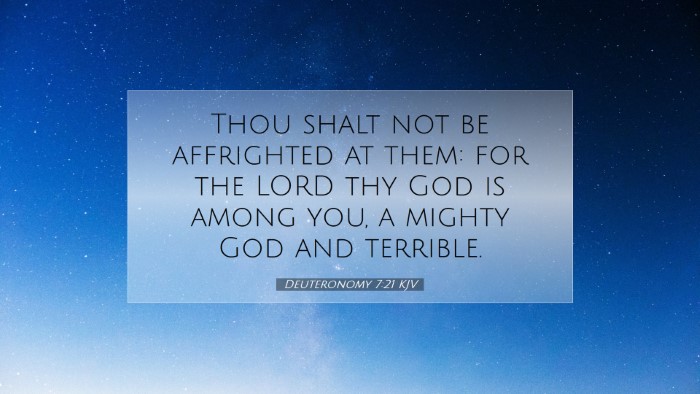Commentary on Deuteronomy 7:21
Bible Verse: "You shall not be terrified of them, for the Lord your God, the great and awesome God, is among you."
Introduction
Deuteronomy 7:21 is a compelling verse that provides assurance to the Israelites as they prepare to enter the Promised Land. This verse emphasizes God's presence, might, and the call to trust in Him amid challenges. Through insights from public domain commentaries, we gain a richer understanding of its theological and practical implications.
Contextual Background
This verse appears within a broader passage where Moses instructs the Israelites about how to deal with the nations they will encounter. Deuteronomy emphasizes the importance of obedience and faithfulness to God while addressing their impending encounters with formidable enemies.
Divine Assurance
1. God's Presence and Power
Matthew Henry emphasizes that the essence of the command not to fear stems from the fundamental truth of God’s presence. He notes that the passage encourages believers not to look at their adversaries but rather to fix their eyes on God, who is described as "great and awesome." This attribute of God assures His people of His ability to deliver them from all foes.
2. Encouragement Against Fear
Adam Clarke elaborates on the notion of fear, which can paralyze and deter even the most faithful. Clarke explains that the call to reject terror is closely linked with recognizing the might of God. The phrase "great and awesome" serves to frame God's character as one who is not only powerful but also loving and protective of His people.
Theological Implications
1. Trust in Divine Sovereignty
Albert Barnes underscores the theological premise that God’s sovereignty is fundamental in the believer's life. The fact that the Israelites are reminded to not fear reveals a vital aspect of faith — that God is in control of history and circumstances. The acknowledgment of God’s sovereignty elevates the discourse from mere human apprehension to divine assurance.
2. The Nature of God
Henry also highlights how this verse reflects the nature of God as one who resides among His people. This indwelling signifies an active involvement in their struggles, suggesting that God does not abandon those He calls His own. The constant reminder of His presence encourages spiritual courage and resilience.
Practical Applications
1. Facing Challenges with Faith
This verse calls pastors, students, and theologians to confront their challenges with the understanding that God's presence is their greatest weapon. As individuals encounter uncertainties in ministry, academia, or personal life, they are urged to lean on God’s great power. The promise of divine support enables effective leadership and faithful witness.
2. The Role of Community
Additionally, Clarke notes that this verse can foster a communal sense of strength. As the Israelites were a nation, their collective faith in God’s presence fortified each member against fear. Church communities, therefore, should cultivate an environment that encourages collective trust in God, reassuring one another in times of trial.
Historical Interpretation
Throughout Christian history, this verse has been a source of comfort for many facing persecution and trials. The early church, for example, drew strength from such promises during periods of intense suffering, interpreting it as a reminder of God’s enduring presence amidst trials.
Conclusion
Deuteronomy 7:21 serves as a timeless reminder of God's incomparable nature and His unshakeable commitment to His people. The charge to not be terrified, coupled with the assurance of God’s presence, calls for a faithful response from all who claim to follow Him. Those involved in teaching and scholarship must convey this truth as they guide others in navigating their fears through an unwavering trust in God’s incredible power and presence.


